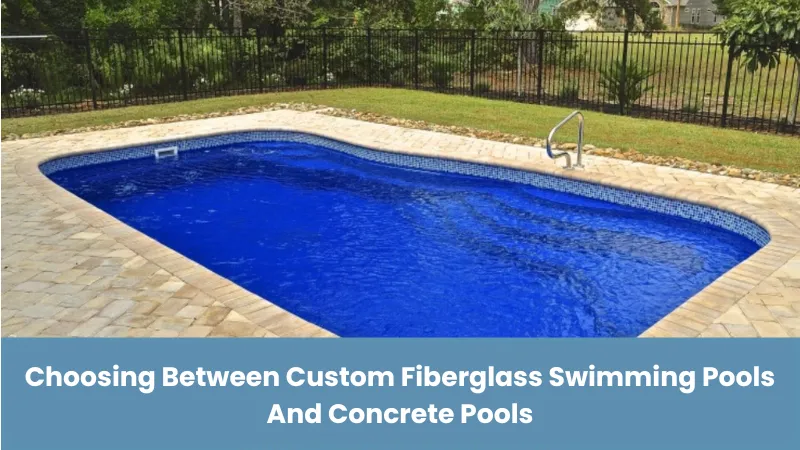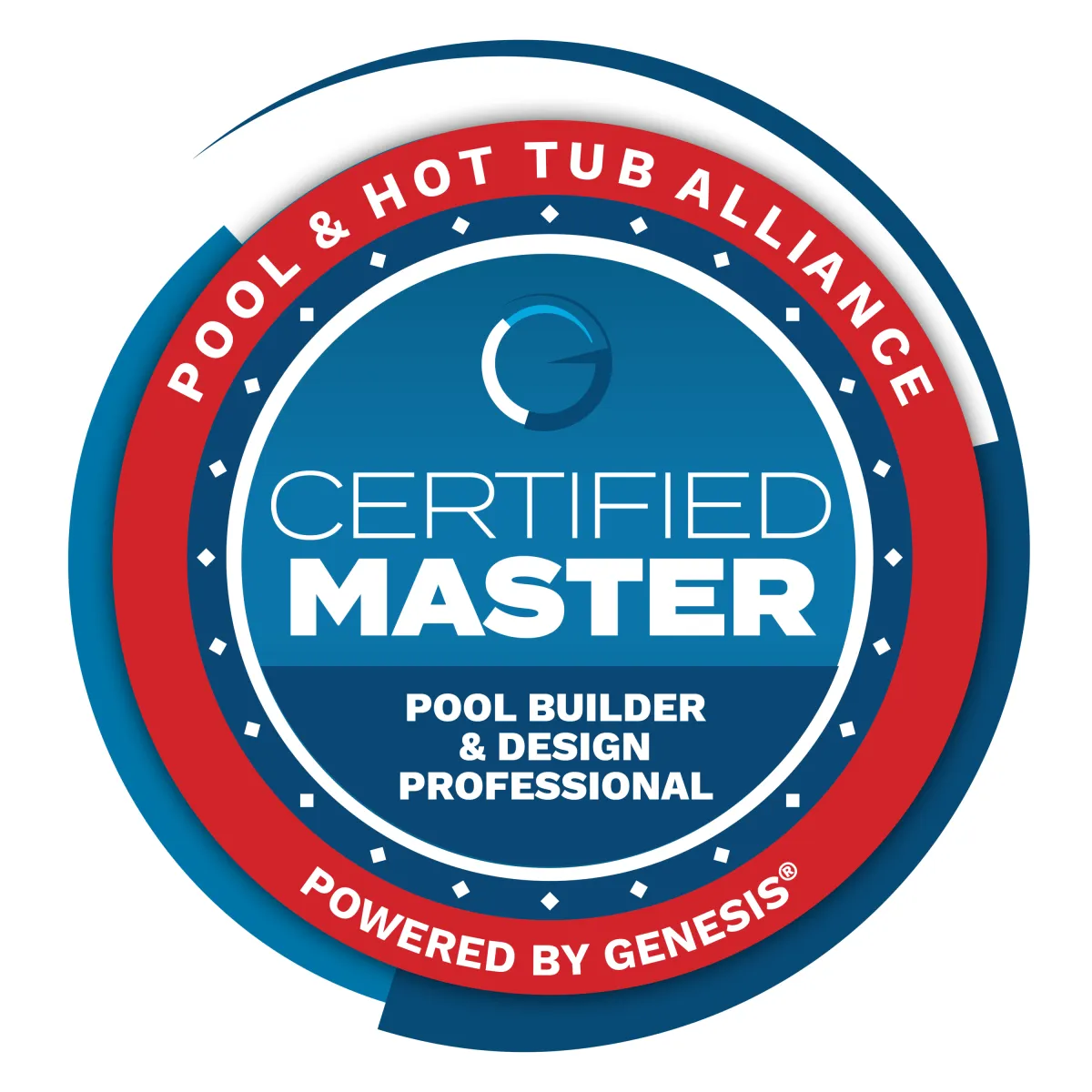The Ultimate Guide to Pools

Choosing Between Custom Fiberglass Swimming Pools And Concrete Pools
Selecting the ideal swimming pool for your backyard can be a rewarding adventure with many choices. With options like custom fiberglass swimming pools and concrete pools, each offering unique benefits, it’s important to weigh your choices carefully. From installation speed and maintenance needs to design flexibility and durability, understanding these factors will help you make an informed decision that aligns with your lifestyle and preferences.
In this guide, we’ll break down the key differences between fiberglass and concrete pools to help you find the perfect fit for your home. Let’s discover which pool type is right for you.

Understanding Custom Fiberglass Swimming Pools
Definition And Features
Custom fiberglass swimming pools are prefabricated pools constructed from fiberglass-reinforced plastic. These pools are created using molds in a factory setting and then transported to your property for installation. The resulting pool features a smooth, non-porous surface that provides both aesthetic appeal and durability.
Key Features:
Durability: One of the major benefits of fiberglass pools is their durability. The fiberglass material is resistant to cracking and can endure extreme weather conditions better than many other pool types. This makes them a robust and long-lasting choice for your backyard.
Flexibility In Design: Although custom fiberglass swimming pools come in pre-designed shapes and sizes, there are a variety of customization options available. Homeowners can select from different finishes and features to tailor the pool to their preferences, within the limits of the pre-molded designs.
Quick Installation: The installation process of these pools is notably faster compared to concrete pools. Once the pool shell arrives, it can be installed in a matter of weeks, reducing disruption and allowing you to enjoy your pool much sooner.
Advantages
Low Maintenance: Custom fiberglass swimming pools require less maintenance due to their non-porous surface, which resists algae growth and staining. This characteristic means less frequent cleaning and fewer chemical treatments, making pool upkeep simpler and more cost-effective.
Quick Installation: The speed of installation is a significant advantage of fiberglass pools. The pool can typically be set up and ready for use in weeks, as opposed to the months often required for concrete pools.
Durability: The durability of custom fiberglass swimming pools is another key benefit. The material’s resistance to common issues like cracking and fading ensures that the pool remains in excellent condition over time, even with regular use.
Energy Efficiency: These pools also offer superior energy efficiency. Their insulating properties help maintain a comfortable water temperature, potentially reducing the need for additional heating and saving on energy costs.
Considerations
Initial Cost: The initial cost of custom fiberglass swimming pools can be higher compared to some other pool types. This reflects the quality of the materials and the advanced manufacturing process. However, this upfront investment is often offset by lower maintenance costs and greater durability over the long term.
Customization Limits: While there are various options for personalization, custom fiberglass pools are generally limited by the shapes and sizes available from the factory molds. This may restrict the ability to create highly unique or unconventional pool designs compared to the flexibility offered by concrete pools.
Exploring Concrete Pools
Definition And Features
Concrete pools, also known as gunite or shotcrete pools, are built using a mixture of cement, sand, and water that is sprayed onto a rebar framework to form the pool’s structure. This construction method allows for a high degree of customization in terms of shape, size, and depth, as the concrete is molded to create the desired pool design. Once the concrete sets, it is usually finished with a plaster, aggregate, or tile surface to enhance its appearance and provide a smooth, watertight finish.
Key Features:
Customization Flexibility: One of the most notable features of concrete pools is their design flexibility. Unlike prefabricated pools, concrete pools can be shaped to fit virtually any design concept, from freeform and lagoon-style to geometric and modern. This allows for a high level of personalization to match the unique dimensions and aesthetics of your backyard.
Structural Strength: Concrete pools are renowned for their structural strength. The robust construction can withstand significant wear and tear and is capable of supporting various features such as waterfalls, built-in spas, and extensive landscaping.
Advantages
Design Flexibility: Concrete pools offer unparalleled design flexibility. Whether you envision a pool with unique contours, a custom depth, or integrated water features, concrete allows for virtually limitless design possibilities. This makes it an ideal choice for homeowners seeking a highly personalized and distinctive pool.
Long-Term Durability: Concrete pools are built to last. Their durable construction means they can withstand harsh weather conditions, heavy use, and other stresses over time. This long lifespan often makes them a worthwhile investment, despite the higher initial cost.
Increased Property Value: Installing a concrete pool can enhance the value of your property. Many buyers view a well-designed concrete pool as a luxury feature that adds appeal and potentially increases resale value. The aesthetic and functional benefits of a concrete pool can make your home stand out in the real estate market.
Considerations
High Maintenance: Concrete pools generally require more maintenance than other types. The porous surface of concrete can lead to algae growth and staining, which necessitates regular cleaning and chemical treatments to keep the pool in optimal condition. This continuous maintenance can be expensive and time-consuming.
Longer Installation Time: The installation of concrete pools is a more time-consuming process compared to fiberglass pools. From excavation to the application of the concrete and finishing touches, it can take several months to complete the installation. This extended timeline can cause disruptions to your outdoor space and delay your enjoyment of the pool.
Cost: Concrete pools tend to have a higher initial cost than other pool types. The expense is attributed to the complexity of the construction process and the materials used. While the investment can be justified by the pool’s durability and customization options, it is important to consider this factor when planning your budget.

Comparing Fiberglass And Concrete Pools
Cost Comparison
Initial Costs: Generally, custom fiberglass swimming pools have a higher upfront cost compared to some other pool types due to the quality of materials and manufacturing processes involved. However, concrete pools often come with a higher initial price tag because of their extensive construction requirements and customization options. While fiberglass pools might seem more expensive at the outset, concrete pools can sometimes exceed this cost depending on the complexity of the design and features.
Maintenance Costs: In the long run, fiberglass pools usually incur lower maintenance costs. Their non-porous surface resists algae growth and staining, leading to fewer chemicals and less frequent cleaning. Concrete pools, on the other hand, have porous surfaces that can lead to algae issues and require more frequent maintenance. This can result in higher ongoing expenses for cleaning and chemical treatments over the pool’s lifespan.
Potential Long-Term Savings: Although fiberglass pools may have a higher initial cost, their lower maintenance requirements and durability often lead to savings over time. Concrete pools, while offering long-term durability, may incur higher maintenance and repair costs. The energy efficiency of fiberglass pools can also contribute to savings on heating costs, as their insulation helps maintain water temperature more effectively.
Installation Time And Process
Installation Time: Fiberglass pools are known for their quick installation process. From delivery to completion, the installation of a fiberglass pool typically takes just a few weeks. This speed is due to the prefabricated nature of the pool, which requires less on-site construction work.
Installation Process: The process for fiberglass pools involves delivering the pre-molded shell, excavating the site, placing the shell, and then connecting plumbing and electrical systems. This streamlined process minimizes disruption to your property and reduces the overall installation time.
In contrast, concrete pools require a more extensive installation process. The construction involves excavation, forming a rebar framework, applying concrete, and finishing with plaster or tile. This process can span several months, causing more significant disruption to your outdoor space and a longer wait before the pool is ready for use.
Maintenance And Durability
Maintenance Needs: Fiberglass pools are easier to maintain due to their smooth, non-porous surface. They require less frequent cleaning and fewer chemical treatments compared to concrete pools. The non-porous nature of fiberglass helps prevent algae growth and staining, making maintenance tasks simpler.
Concrete Pools Demand More Maintenance: Their porous surface can attract algae and stains, necessitating regular cleaning and more frequent chemical treatments. This additional maintenance can increase the overall cost and effort involved in keeping the pool in good condition.
Durability: Both types of pools are durable, but in different ways. Custom fiberglass swimming pools are highly resistant to cracking and can handle extreme weather conditions well. Concrete pools are also robust and long-lasting, but their surface may be prone to cracking and fading over time if not properly maintained.
Design And Customization
Design Flexibility: Concrete pools offer exceptional design flexibility. They can be shaped to fit virtually any space and customized with a wide range of features, including unique shapes, depths, and integrated water elements. This makes them ideal for homeowners seeking a highly personalized pool.
Customization Options: Fiberglass pools, while offering various pre-designed shapes and finishes, have some limitations compared to concrete pools. They are molded in factory settings, which constrains the extent of customization to the options available from the manufacturer. However, within these options, there is still room for personalization with different finishes and features.
Energy Efficiency And Environmental Impact
Energy Efficiency: Fiberglass pools typically have better energy efficiency compared to concrete pools. Their insulating properties help retain heat, which can reduce the need for additional heating and lower energy costs. This can also contribute to a more environmentally friendly pool by reducing energy consumption.
Environmental Considerations: The manufacturing process for fiberglass pools involves the use of synthetic materials and resins, which can have environmental impacts. However, their long-term durability and energy efficiency might offset some of these concerns. Concrete pools, while made from natural materials, require significant water and energy during the construction process and can have a larger carbon footprint due to the cement production.
Making The Right Choice For Your Backyard
Assessing Your Needs And Preferences
When choosing between fiberglass and concrete pools, it’s essential to assess your individual needs and preferences. Start by evaluating your budget, as this will significantly influence your decision. Custom fiberglass swimming pools generally have a higher initial cost but offer lower maintenance expenses over time. Concrete pools may involve a higher upfront investment and ongoing maintenance costs, but they provide extensive customization options and long-term durability.
Space And Design Considerations: Consider the available space in your backyard and the design features you desire. Fiberglass pools are ideal for smaller spaces due to their quick installation and the availability of various pre-designed shapes. If you have a large yard and are looking for a highly customized pool with unique features, a concrete pool might be more suitable due to its flexibility in design.
Desired Features: Think about the features you want in your pool, such as waterfalls, built-in spas, or specific shapes. Concrete pools excel in providing custom features and unique designs, while fiberglass pools offer a range of pre-designed options that can still be tailored with various finishes and accessories.

Climate Factors To Consider
Local climate conditions play a crucial role in determining the best pool type for your home.
Climate Impact On Fiberglass Pools: Fiberglass pools are well-suited for a variety of climates, particularly those with extreme weather conditions. Their resistance to cracking and fading makes them a good choice for areas with fluctuating temperatures. Additionally, their energy-efficient properties help maintain water temperature, potentially reducing heating costs.
Climate Impact On Concrete Pools: Concrete pools are durable and can handle severe weather conditions, but they may be more prone to issues like cracking in areas with extreme temperature swings if not properly maintained. Appropriate winterization is necessary in colder climates to avoid damage. Concrete pools can also require more frequent maintenance in climates with high algae growth due to their porous surface.
Choosing between custom fiberglass swimming pools and concrete pools involves balancing key factors. Fiberglass pools are known for their quick installation, low maintenance, and energy efficiency, though they may come with a higher initial cost and limited design flexibility. Concrete pools offer extensive design options and durability, potentially boosting property value, but they usually involve higher maintenance, longer installation times, and greater upfront expenses.
Your backyard is calling for a makeover! Whether it's the efficiency of a custom fiberglass swimming pool or the charm of a concrete creation, let’s make your outdoor dreams come true. Contact Midwest Pools now and let’s make a splash together! 🌞🌊
Copyright 2023 MidWest Pools. All Right Reserved
Built by StreamLeads.io




